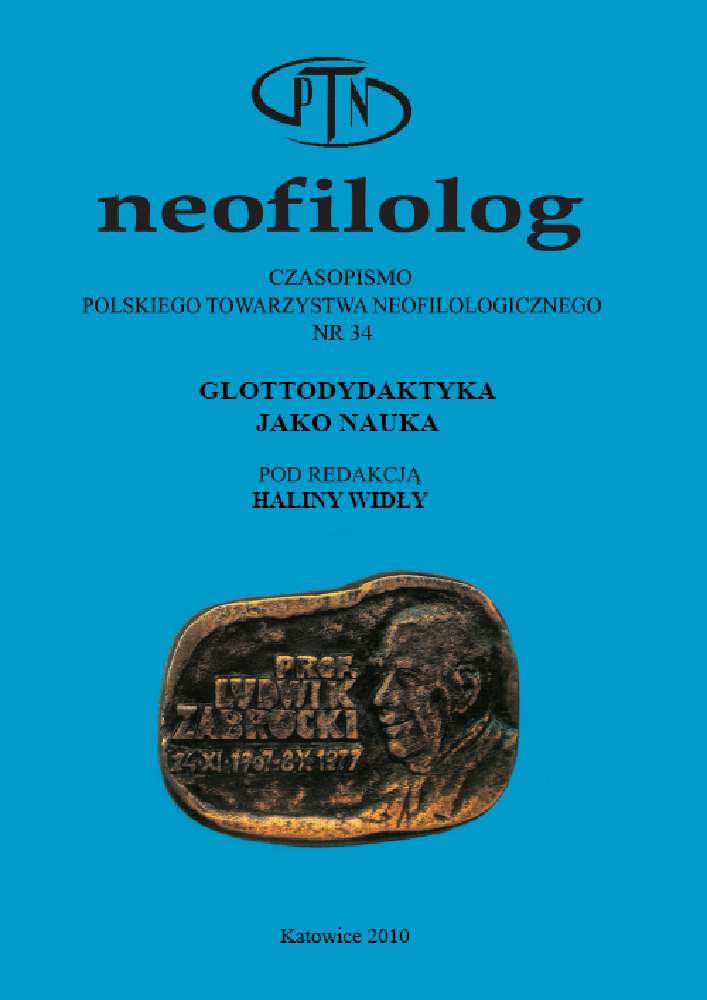Résumé
An individual case study is a research procedure and at the same time a practical approach which makes it possible to apply a variety of data gathering instruments. One such instrument is dialogue, which is described in this article as a tool meant for the diagnosis and treatment of difficulties in foreign language learning as experienced by students with special educational needs who have disturbed development in their native language.
Références
Borowiec, H. 2007. „Kategorie interpretowania rzeczywistości w języku dzieci”. (w) T. Woźniak i A. Domagała (red.). Jęz yk, interakcja, zaburzenia mowy. Metodologia badań. Lublin: Wydawnictwo UMCS, seria: Mowa. Teoria – Praktyka. Tom 2/2007, str.: 107 – 132.
Barth, B. M. 1993. Le savoir en construction. Former à une pédagogie de la compréhension. Paris: Retz.
Buber, M. 1992. Ja i Ty. (przekł. Jan Doktór). Warszawa: Instytut Wydawniczy PAX. str.: 39 – 126.
Feuille d’IF nr 18 (Revue d’échanges, de réflexions et d’informations autour de la gestion mentale éditée par Initiative et Formation Belgique). 2009. Le dialogue pédagogique, témoignages et réflexions (red. P.-P. Delvaux).
Gaté, J. P. 2000. Les entretiens métacognitifs à visée pédagogique: vers une clinique éducationnelle. (w) Gestion mentale et mobilité de la pensée. Actes du colloque international de Gestion mentale. Rimouski, 14 – 16 août 2000, str.: 109 – 133.
Karpińska-Szaj, K. 2008. „Nauczyciel języka obcego jako terapeuta mowy”. (w): Jaroszewska, A i M. Lorenc (red.) Kultury i jęz yki: poznawać – ucz yć się – nauczać. Księga Jubileuszowa dla Pani Profesor Elżbiety Zawadzkiej-Barnik. Warszawa: Wydawnictwo Uniwersytetu Warszawskiego, str.: 61 – 70.
Karpińska-Szaj, K. 2009. « Autour de la compétence d’apprentissage: les
pratiques transferogènes pour les élèves en difficulté du langage » (w) Szymankiewicz, K. i J. Zając (red.) Développer les compétences multiples chez
l’enseignant et chez l’apprenant en classe de langue. Warszawa: Wydawnictwo Uniwersytetu Warszawskiego – w druku.
Klus-Stańska, D. 2002. Narracje w szkole. (w) J. Trzebiński (red.). Narracja jako sposób rozumienia świata. Gdańsk: Gdańskie Wydawnictwo Psychologiczne, str.: 189 – 220.
La Garanderie, A. de 1984. Le dialogue pédagogique avec l’élève. Paris: Le Centurion.
La Garanderie A. de 2000. « Projet de sens et mouvements ». (w): Actes du Colloque International de Gestion Mentale Gestion mentale et mobilité de la pensée, Rimuski 14 – 16 août 2000. Paris-Orsay: Institut International de Gestion Mentale, str.: 15 – 40.
Lewowicki, T. 1977. Indywidualizacja kształcenia. Dydaktyka różnicowa. Warszawa: Państwowe Wydawnictwo Naukowe.
Lévesque, J.-Y. 2000. « Gestion mentale, enseignement stratégique et actualisation du potentiel intellectuel: fondement et convergences ». (w): Actes du
Colloque International de Gestion Mentale Gestion mentale et mobilité de la pensée, Rimuski 14 – 16 août 2000. Paris-Orsay: Institut International de Gestion Mentale, str.: 157 – 192.
Łobocki, M. 2009. Metody i techniki badań pedagogicznych. Kraków: Oficyna Wydawnicza Impuls.
Meirieu, Ph. 2003 [1996]. Frankenstein pédagogue. Paris: ESF éditeur.
Meirieu, Ph. 2004 [1985]. L’école: mode d’emploi – Des « méthodes actives » à la « pédagogie différenciée ». Paris: ESF éditeur.
Nęcka, E. 2003. Inteligencja. Geneza – Struktura – Funkcje. Gdańsk: Gdańskie Wydawnictwo Psychologiczne. Seria: Postępy Psychologii.
Ostrowska, U. 2000. Dialog w pedagogicznym badaniu jakościowym. Kraków: Oficyna Wydawnicza Impuls.
Pawlak, M. 2009. „Metodologia badań nad strategiami uczenia się”. (w): M. Pawlak (red.) Metodologia badań w jęz ykoznawstwie stosowanym. Neofilolog 32: 65 – 84.
Perraudeau, M. 1998. Echanger pour apprendre: l’entretien critique. Paris: Armand Colin.
Stachlewicz, K. 2003. Fenomenologia a dialog. (w): J. Baniak (red.) Filozofia dialogu. Tom 1. Drogi i formy dialogu, str.: 47 – 59.
Tardif, J. 1999. Le transfert des apprentissages. Montréal: Les Editions Logiques.
Vermersch, P. 1994. L’entretien d’explication. Paris: E.S.F.
Vermersch, P. 1999. « Pour une psychologie phénoménologique ». Psychologie Française 44/1: 7 – 18.
Wiśniewska, D. 2009. « Dialog jako przestrzeń miedzy badaniem, poznaniem a rozwojem nauczyciela » (w) J. Nijakowska (red.). Jęz yk – Poznanie – Zachowanie.
Perspektywy i wyzwania w studiach nad prz yswajaniem jęz yka obcego. Łódź: Wydawnictwo Uniwersytetu Łódzkiego, str.: 283 – 298.
Wygotski, L. S. 1989 [1966]. Myślenie i mowa. Warszawa: PWN.
http://www.ifbelgique.be/ (DW: 14.10.2009)
http://www.iigm.org/ (DW: 14.10.2009)
http://www.conaisens.org/ (DW: 14.10.2009)
http://www.signesetsens.eu/ (DW: 14.10.2009)
Licence
© Katarzyna Karpińska-Szaj 1970

Ce travail est disponible sous licence Creative Commons Attribution - Pas de Modification 4.0 International.
Auteurs :
Les auteurs de textes acceptés pour publication dans la revue Neofilolog sont tenus de remplir, signer et renvoyer à l'adresse de la rédaction, un accord sur l'octroi d'une licence gratuite pour les œuvres, avec obligation d'accorder une sous-licence CC.
En vertu de cet accord, les auteurs des textes publiés dans la revue Neofilolog accordent à l'Université Adam Mickiewicz de Poznań une licence non exclusive et gratuite et permettent l'utilisation de la sous-licence Creative Commons Attribution-NoDerivatives 4.0 International (CC BY-ND 4.0).
Les auteurs se réservent le droit de disposer librement de l'œuvre.
Utilisateurs :
Les utilisateurs d'Internet intéressés ont le droit d'utiliser les œuvres publiées à partir de l'année 2017 sous réserve des conditions suivantes :
- reconnaissance de la qualité d'auteur - l'obligation de fournir des informations sur la qualité d'auteur, le titre, la source (liens vers l'œuvre originale, DOI) et la licence, ainsi que l'œuvre distribuée ;
- sans créer d'œuvres dérivées - l'œuvre doit être conservée dans sa forme originale, p. ex. les traductions ou les interprétations ne peuvent être distribuées sans le consentement de l'auteur.
Tous les textes publiés sont soumis au droit d'auteur.
Autres :
L'Université Adam Mickiewicz de Poznań se réserve le droit à la revue dans son ensemble (mise en page, forme graphique, titre, conception de la couverture, logo, etc.).
.
